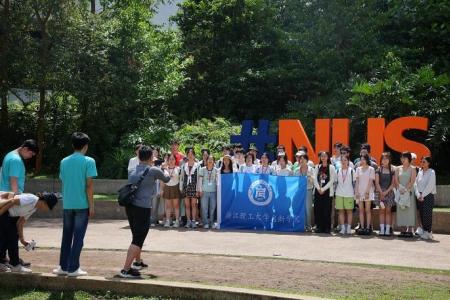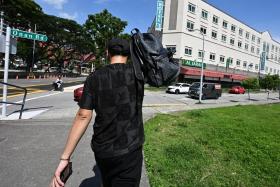NUSSU wants to address issue of tourists on campus
The National University of Singapore Students’ Union (NUSSU) is calling for a town hall with undergraduates on Aug 21 to address students’ unhappiness over an influx of tourists to the campus.
The influx, which was first reported earlier this year, saw students up in arms about overcrowding in canteens and internal shuttle buses, among other issues. The complaints prompted NUS’ administration to set up a pop-up visitor centre to manage the flow of visitors better.
In an Aug 14 circular to staff and students signed by associate provost for undergraduate education Daniel Goh, the National University of Singapore (NUS), which has just commenced its new academic year, acknowledged the influx of tourists, citing the “summer travel season of Asian countries”.
It added that NUS would be implementing “targeted measures to manage visitor traffic and reduce disruptions to teaching and student life activities”.
Under a two-month pilot initiative, 40 undergraduates are being deployed as NUS student ambassadors, where they will be paid to educate tourists on etiquette on campus and lead guided tours.
NUS said that its student ambassadors, dressed in teal shirts, have guided more than 25 tours and about 500 tourists in the past two weeks. It is unclear when these tours started.
The Straits Times understands that there are four student ambassadors on the ground per hour. If there is an official tour led by a tour guide, an additional two student ambassadors will accompany the tour group.
There were 14 other measures listed in the circular, which included ensuring tour buses pick up and drop off visitors only at designated points, increasing the frequency of internal shuttle buses and prioritising access for staff and students during peak hours.
However, in a statement issued on Aug 15, NUSSU said the measures put in place by the university’s administration were “insufficient”.
“The union is dissatisfied with the current measures due to the lack of priority placed on students’ interest before the public,” it said.
The union proposed some solutions.
These include:
- Accepting only registered tour groups, with tour buses clearly identified with a registered tour access pass. Those found without a valid pass will be fined and asked to leave the campus immediately.
- Keeping access to all NUS libraries only to students.
- Restricting access to dining areas at UTown’s Fine Food and Food Clique at peak hours to only staff and students.
- Having passengers board internal shuttles only from the front doors, with drivers checking for valid NUS Student/Staff cards.
- Deploying student enforcement officers at various canteens and bus stops during peak hours.
They could be seen walking around with umbrellas on campus, although students shared that the tourists are not allowed indoors. Some children could also be seen running around the campus, while weaving through the crowd.
ST spoke to 15 students and while most said they have become used to the tourists, they also voiced frustration at having to compete with tourists either for seats and food in the canteen or on the shuttle buses.
Second-year biomedical engineering undergraduate Victoria Toh told ST: “I’ve been finding it difficult to take the bus as tourists have been hogging it. I’ve resorted to walking to class a few times, which takes me around 15 minutes, doubling my travel time.”
Expressing annoyance at the situation, she added: “The campus here is huge, and we students rely heavily on the buses catered to us to get around, especially when we have back-to-back classes.”
Fellow student Bertan Lim agreed and pointed to another primary issue at canteens - tourists not cleaning up after themselves, and cutting queues. The crowds also become overbearing when they block entryways and walkways, blocking students who are rushing to their next class, he said.
The situation at NTU
Over at the Nanyang Technological University, Year 4 business undergraduate Aazon Ang, 24, told ST that many tourists still wander around on campus, especially at learning hub The Hive, a popular spot for photo-taking because it resembles a dim sum basket.
He recalled an incident earlier this year when he nearly hit a tourist while driving, saying: “She rushed out onto the middle of the road, flouting traffic rules to pose for a photo with The Hive.”
“The building is not designed to accommodate tourists who might want to take a photograph with it,” he added, citing narrow walkways and the lack of a designated photo-taking area.
There is also often overcrowding at canteens and on campus buses, added Mr Ang.
In response to queries from ST, a spokesperson from NTU said on Aug 15 that all agencies planning campus tours have to seek prior approval from the university.
“The university welcomes visitors to our campus,” said the spokesperson. “However, as a place of learning and research, the needs of our faculty, staff, and students must come first.”
All visitors are expected to strictly observe campus rules, including no-stopping zones for vehicles and visitors must keep only to public areas, added the spokesperson.
The university also said in February that it would be deploying additional security personnel across its campus.
NTU’s policy of introducing a registration fee appears to be having an effect.
Ms Liang Wern Ling, co-founder of Le Yeah Learning which operates educational tours and programmes, said she no longer organises tours to NTU due to the registration fee.
“I don’t think that having to pay is reasonable - it’s an honour that people want to visit,” she said, adding that the university should focus on educating visitors and travel agencies on proper etiquette instead.
Students, prospective students and parents, from China, and even South Korea and Japan, make up the bulk of visitors on her tours.
“I’ve also observed an increasing number of independent travellers, mostly families with teenage children who visit the schools without a guide,” said Ms Liang.
‘Numbers speak for themselves’
An NUS tour by her company includes pit stops at the NUS Museum, Central Library and UTown. Visitors are taken around the campus with a coach chartered by the company, passing by residential halls.
Mr Melvin Lee, chief executive and director of educational consultant Flying Chalks, has removed campus visits from some travel itineraries and now conducts fewer of such tours.
Mr Lee, who said that the wean-off is temporary, said he was unable to find updated policies for visitors following the February announcement that universities were revising their regulations.
He noted that the stricter policies are unlikely to stem the influx altogether, as “foreign visitors will continue to find ways and alternatives to visit these campuses”.
When asked why the tourists are flocking to the Clementi campus, Ms Liang pointed to the Quacquarelli Symonds (QS) World University Rankings 2025, where NUS is ranked eighth, and said: “Numbers speak for themselves. Just like how we go to Oxford or Cambridge, people want to visit NUS.”
Get The New Paper on your phone with the free TNP app. Download from the Apple App Store or Google Play Store now


